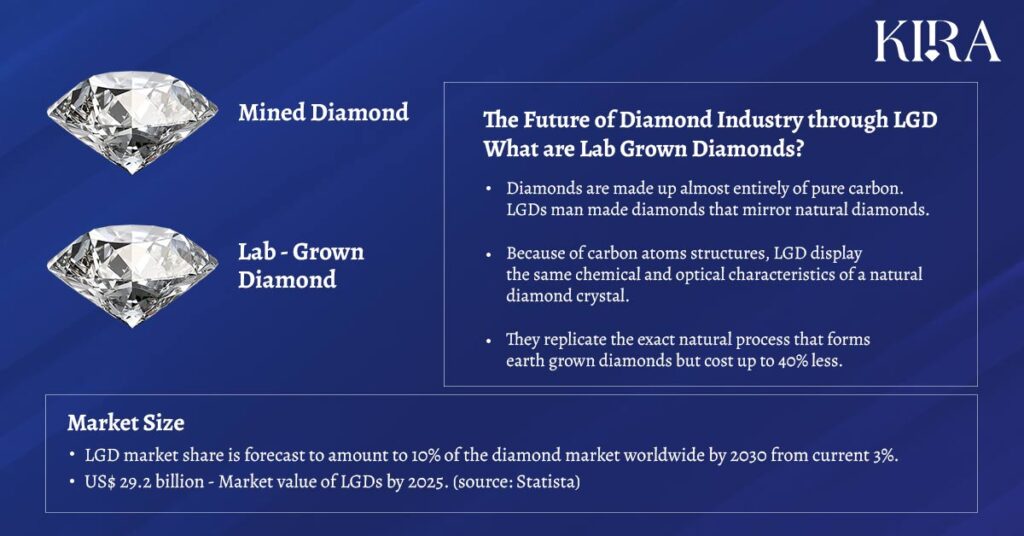Diamonds have long been associated with love, luxury, and commitment. However, the industry surrounding these sparkling gems has come under increasing scrutiny in recent years. Many argue that the diamond industry is built on a foundation of diamonds are a scam, with prices inflated beyond their actual worth and marketing campaigns designed to create an artificial sense of desire. This article delves into the criticisms leveled against the diamond industry, explores the ethical concerns surrounding diamond mining, and presents compelling alternatives for consumers seeking a more responsible and transparent approach to gemstone purchases.
This article will first examine the common criticisms directed at the diamond industry, highlighting the practices that have led to accusations of deception. We will then explore the ethical dilemmas inherent in diamond mining, including issues of labor exploitation, environmental damage, and conflict financing. Finally, we will introduce a range of ethical and sustainable alternatives to traditional diamonds, empowering consumers to make informed choices that align with their values.
Diamond Industry Criticism
One of the most persistent criticisms of the diamond industry is the practice of price fixing. For decades, the De Beers company, a dominant player in the diamond market, controlled the supply of rough diamonds, effectively dictating prices to retailers and consumers. This monopoly allowed De Beers to maintain artificially high prices, far exceeding the actual cost of mining and processing diamonds. While De Beers no longer holds the same level of control, the industry continues to be criticized for its lack of transparency and its reluctance to disclose the true cost of diamonds.
Another common criticism is the industry’s reliance on misleading marketing tactics. Diamonds are often portrayed as symbols of eternal love and commitment, leading consumers to believe that they are essential for expressing these sentiments. This emotional manipulation can result in consumers overpaying for diamonds, driven by societal pressures and idealized notions rather than genuine value.
Furthermore, the diamond industry has been accused of perpetuating a culture of consumerism and materialism. The constant promotion of diamonds as status symbols encourages a cycle of desire and acquisition, leading to unsustainable consumption patterns and environmental damage.
Ethical Concerns in Diamond Mining

The ethical implications of diamond mining are far-reaching and deeply concerning. Many diamond mines operate in conflict zones, where profits are used to fund armed groups and perpetuate violence. This “blood diamond” trade has devastating consequences for local communities, fueling instability and human rights abuses.
Moreover, diamond mining often involves the exploitation of labor. Workers in many mines face dangerous working conditions, low wages, and limited access to basic necessities. Child labor is also a persistent problem in the diamond industry, with children forced to work in hazardous environments for little or no pay.
The environmental impact of diamond mining is another significant concern. Mining operations can lead to deforestation, habitat destruction, and water pollution, harming ecosystems and threatening biodiversity. The extraction of diamonds also requires significant amounts of energy, contributing to greenhouse gas emissions and climate change.
Diamond Alternatives
Fortunately, there are a growing number of ethical and sustainable alternatives to traditional diamonds. These alternatives offer consumers a way to express their individuality and celebrate special occasions without contributing to the harmful practices associated with the diamond industry.
Lab-Grown Diamonds
Lab-grown diamonds are chemically and physically identical to mined diamonds, but they are created in controlled laboratory environments. This process eliminates the ethical concerns associated with diamond mining, as there is no need to extract diamonds from the earth. Lab-grown diamonds are also more affordable than mined diamonds, making them a more accessible option for consumers.
Gemstone Alternatives
A wide variety of gemstones offer stunning beauty and durability, providing ethical and sustainable alternatives to diamonds. Sapphires, emeralds, rubies, and opals are just a few examples of gemstones that can be used in jewelry. Each gemstone has its own unique characteristics and symbolism, allowing consumers to choose a stone that resonates with their personal style and values.
Alternative Materials
For those seeking truly innovative alternatives, there are a growing number of materials that mimic the appearance of diamonds without the ethical baggage. Moissanite, for example, is a naturally occurring mineral that is even more brilliant than diamond. Other materials, such as cubic zirconia and lab-created gemstones, offer affordable and ethical options for jewelry lovers.
Lab-Grown Diamonds

Lab-grown diamonds are gaining popularity as a more ethical and sustainable alternative to mined diamonds. These diamonds are created in controlled laboratory environments using advanced technology, replicating the natural growth process of diamonds. The result is a diamond that is chemically, physically, and optically identical to a mined diamond, but without the ethical concerns associated with diamond mining.
One of the key advantages of lab-grown diamonds is their affordability. Since they are not subject to the same market forces as mined diamonds, lab-grown diamonds can be significantly less expensive. This makes them a more accessible option for consumers who may not be able to afford a mined diamond.
Another benefit of lab-grown diamonds is their environmental sustainability. The production of lab-grown diamonds requires significantly less energy and resources than the mining of diamonds. Furthermore, lab-grown diamonds do not contribute to deforestation, habitat destruction, or water pollution, which are all associated with traditional diamond mining.
Ethical Sourcing Practices
For consumers who are committed to ethical sourcing, there are several organizations that certify diamonds as conflict-free and responsibly mined. The Kimberley Process Certification Scheme (KPCS) is an international initiative that aims to prevent the trade of conflict diamonds. The Responsible Jewellery Council (RJC) sets standards for ethical, social, and environmental responsibility throughout the jewelry supply chain.
When purchasing diamonds, it is important to ask retailers about their sourcing practices and to look for certifications from reputable organizations. By choosing diamonds that have been ethically sourced, consumers can help to ensure that their purchases do not contribute to human rights abuses or environmental damage.
Conclusion
The diamond industry has long been shrouded in controversy, with accusations of diamonds are a scam, unethical practices, and environmental damage. Consumers are increasingly aware of these issues and are seeking more ethical and sustainable alternatives. Lab-grown diamonds, gemstone alternatives, and alternative materials offer compelling options for those who want to express their individuality and celebrate special occasions without compromising their values. By choosing ethically sourced diamonds or exploring these alternatives, consumers can make a positive impact on the world and support a more responsible and transparent jewelry industry.



